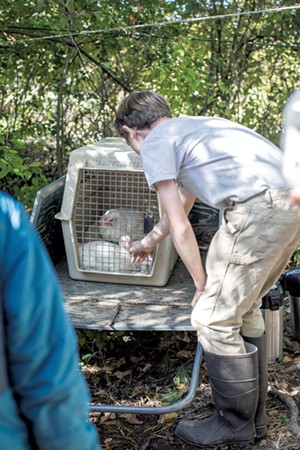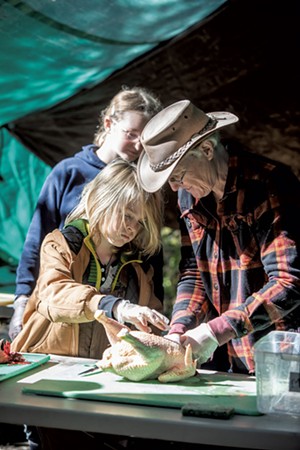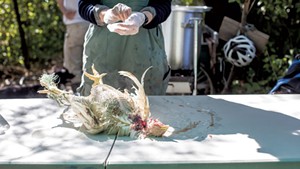
- Luke Awtry
- A freshly slaughtered meat bird at New Village Farm
Chicken slaughter features vividly among Michaela Ryan's earliest memories. The founder-owner of New Village Farm in Shelburne grew up on a farm in southern Québec. She was 3 years old when her father killed a meat bird, and it escaped his grasp to become the proverbial chicken running around with its head cut off.
"A headless running bird is one of my very first memories," Ryan, 52, said. "It was definitely traumatic."
Ryan shared the anecdote on a bright early October morning shortly after she and New Village Farm's program director, Maggie Joseph, 24, had finished slaughtering five meat birds that would be sold at the on-site farmstand. Fourteen youngsters, ages 6 to 13, from the farm school day program observed as the women carefully held each chicken, cut its neck and steadied the body through its final nerve spasms. Many of the kids then helped scald, pluck and eviscerate the freshly killed chickens.
The activity had been carefully planned and managed to avoid the kind of trauma that Ryan experienced as a child. Each participant and their parents had opted in, and kids were offered multiple chances to reconsider their choice.
When Ryan established New Village Farm in 2008, she wanted to "create a space where children can engage in farming and nature, for better or worse — all the parts of it," she said.
Over the course of a year, about 400 kids come to the 99-acre educational farm as part of vacation camps, the farm school program or field trips from local schools. They see chicks hatch, milk goats and cows, and feed and care for a small menagerie of livestock.
The chores build competence and confidence, Ryan said, and the youngsters learn exactly where their food comes from. She believes that the farm is also a perfect place to introduce kids to the entire life cycle and to help them develop skills to cope with inevitable losses.
"I'm a livestock farmer. I could not step into that without an ability to process and be with loss every day," Ryan said.
While farmers do everything they can to nourish and protect their animals, deaths occur at birth and through illness or predation. And often, after all that work to keep the animals alive, she said, "You're responsible for choosing the moment of their death."
Before the chicken slaughter happened, Joseph and Ryan had previewed it for the kids, who listened in a wide circle, seated on logs or perched in trees. The two adults used plenty of explicit detail and no euphemisms. "We don't want there to be any surprises for you," Joseph said.
"Death is something that surrounds us, especially at this time of year, when plants begin to die and the blackflies are all disappearing," she continued. "In America, we live in this death-phobic culture. But today, we are starting to build our tool kit around death."
Joseph acknowledged that choosing death for another living creature is complicated. "It comes with great weight and responsibility," she told the group. "We want to ground ourselves in gratitude. This is death for a purpose: for nourishment of our community and nourishment, financially, of our farm."

- Luke Awtry
- Olivier, 13, and chickens about to be slaughtered
Ryan picked up the conversational baton and offered the kids a chance to bow out. "The important thing right now is to check in with yourself," she said, mincing no words. "How do you feel about watching birds be killed?"
Leslie, 7, raised his hand. "Can you change your mind at the slaughter?" he asked.
Ryan reassured the group members that they could leave or return at any point. Then she described the process step-by-step, including exactly how she and Joseph would kill the birds.
Often, Ryan explained, the cut through the neck releases two spurting streams of blood. In response to one loud exclamation of disgust, Ryan said evenly to the group, "Whenever you go to 'Ewwww,' see if you can come back to gratitude."
After every detail had been covered, the educators approached each child for an individual check-in before the group headed to the chicken pen to select five birds for slaughter.
"I wonder if they know," said Rayleigh, 12, peering into the crate.
Attendees at New Village Farm's educational chicken slaughter sessions tend to be the more seasoned farm school or camp participants, Ryan had told Seven Days earlier. Other kids, she said, "know it's happening, and they're invited to write a poem or put some flowers in the pen. The next week when they come in, if they want to talk about it, we're available to talk."
Even without direct exposure to slaughter, nature provides daily lessons in loss for those willing to engage, Ryan said. At New Village Farm, that might be a sparrow found lifeless in the garden, a snake run over by a tractor or a chicken mistakenly left outside the coop at night. Each instance offers a different way to start the conversation, Ryan said.
"We basically don't turn away when death presents itself," Ryan said. "Through exposure to loss that's a little bit less personal on a farm, we can equip children to become resilient and have processes around a loss or a death."
In addition to being a farmer, Ryan is a grief recovery specialist certified by the Idaho-based nonprofit Grief Recovery Institute. In January, she will lead a four-part workshop for adults about helping children deal with loss.
"Our culture just has a lot of bad habits around loss and grief," Ryan explained. "When your parents tell you [to] go to your room to cry, the message is, you know, 'Go be isolated.'" When adults say, "Don't cry. Have a cookie," she continued, the advice encourages children to soothe themselves with food and can pave the way for similar use of alcohol or other substances later in life.
"The dog dies; you buy the puppy the next week," Ryan said. "It's sort of replace-the-loss culture."
The general message kids receive is that sorrow and anger are emotions to be suppressed rather than faced and processed, Ryan said.

- Luke Awtry
- From left: Agnés, 11; Leslie, 7; and New Village Farm founder/owner Michaela Ryan processing a meat bird
In contrast, the New Village farmer-educators model constructive ways to work through loss. "Are there amends to be made? Are there things to forgive? Are there significant emotional statements that were unexpressed?" Ryan said.
A few years ago, a beloved farm cat was run over by a car right before a regular Lake Champlain Waldorf School class visit. After securing parental permission, "We brought it to our circle," Ryan recalled. "The kids could look at what a dead cat looks like — not a media version but a real-life version — and they asked all the questions they needed to ask."
Ryan needed to grieve, too. "I just said, 'You know, when I experience this type of emotion around death, the best thing for me to do is get a hug from a friend.'" The kids waited while she went to see a friend who was volunteering on the farm that day. "I cried some more, and then I sat back down," Ryan said.
"It's about helping them notice sad emotions for themselves and think about what works, think about what's helpful and try to seek that out," she said.
One attendee at the slaughter on that October day was Laura Derrendinger of Middletown Springs, the mother of four farm school participants ages 6 to 13, three of whom accompanied her. She said it was the first time they would witness such a death.
"It's a privileged learning opportunity," Derrendinger, 46, said. "Everything they learn here is a blueprint for so many other things."
In a small clearing in the woods, the kids and educators prepared for the chicken slaughter. They helped scrub tubs and checked the temperature of a huge pot of water set up to scald the birds.
Over the course of the slaughter, a few youngsters chose to leave, but most stayed. "Now I'm not scared, because they are already dead," Quinton, 6, said as he helped to pluck feathers. "Well, I'm still a tiny bit scared," he added.
At a table where Ryan was demonstrating the final step of evisceration, she pulled out a handful of intestines connected to a translucent web of tissue. That is the mesentery, which holds the intestines in place, she explained.
Derrendinger, a registered nurse, said that the hands-on biology lesson was invaluable. When she was her children's age, she said, "I had to learn anatomy from frogs in formaldehyde."
Lucinda, 8, summarized her thoughts after helping at the evisceration table. "The plucking part and seeing the intestines and all the stuff inside was very interesting," she said. "The cutting-off-the-head part — not my favorite."
Olivier, 13, and his siblings raise chickens at home, and he said he was glad to have seen and helped with the whole process. "I don't think I could kill them myself, though," he admitted.
A week after the slaughter, Derrendinger reflected on its impact on her family. "The children saw a respectful transition in part of the cycle of life," she wrote by text. "That experience to witness death in a safe, respectful, caring place is now a reference point [they] will be able to apply later."
Derrendinger observed an interesting irony: The educational system often uses chickens and eggs to introduce children to birth and reproduction, but it rarely addresses the other end of life in any proactive way. "We do not systematically teach about death in terms of both the physiology and the spiritual part," she wrote.
The unfortunate result, Derrendinger said, is that "in many cases, learning about death for children is a trauma."











Comments
Comments are closed.
From 2014-2020, Seven Days allowed readers to comment on all stories posted on our website. While we've appreciated the suggestions and insights, right now Seven Days is prioritizing our core mission — producing high-quality, responsible local journalism — over moderating online debates between readers.
To criticize, correct or praise our reporting, please send us a letter to the editor or send us a tip. We’ll check it out and report the results.
Online comments may return when we have better tech tools for managing them. Thanks for reading.